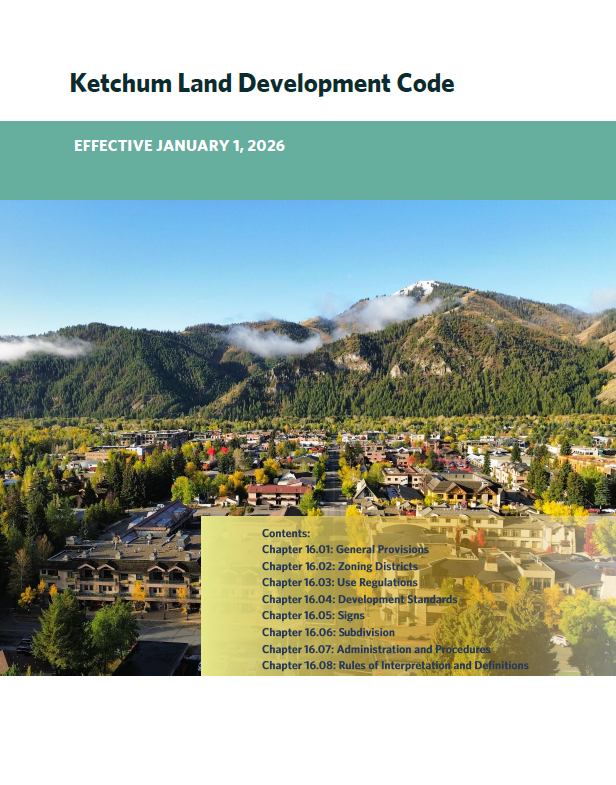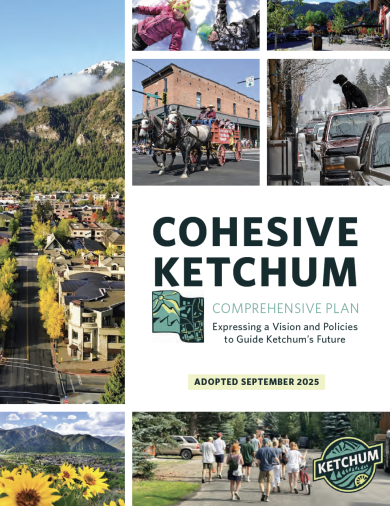

Comprehensive Plan and Land Development Code
City Council approved the consolidated and reorganized code on November 17, 2025 (watch here). The regulations are in effect as of January 1, 2026. The newly adopted code consolidates the City’s Zoning Ordinance, Subdivision Regulations, and Right-of-Way Standards (Title’s 17, 16, & 12) into a unified Land Development Code. It includes general format updates to improve usability as well as minor changes to remove inconsistencies and clarify ambiguities. No substantive changes have been made.
Comprehensive Plan – Adopted September 2025
The Ketchum City Council held a public hearing and adopted the 2025 Cohesive Ketchum Comprehensive Plan on September 11, 2025. Click here to watch the meeting and click on the image below to view and download the adopted plan. The city is grateful to all who participated in the process and looks forward to continuing discussions on community-wide issues through the development of future changes to the city’s land use regulations.
Our Vision
“We aspire to be an authentic mountain community with world-class character, yet small-town feel. We value our strong sense of community and high quality of life for year-round residents and visitors. We will be successful by creating, attracting, and delivering excellent jobs, education, healthcare, recreation, and cultural opportunities. Furthermore, we wish to be a place with a stable economy, a vibrant downtown, a variety of community housing options, and a diverse population of people who live, work, and visit here. We will be responsible stewards of our environment, work toward a resilient economy, and maintain our special way of life for generations to come.”
Why Update?
Ketchum has changed a lot in the past 10 years:
- we’ve welcomed new community members;
- economic conditions have changed;
- tourism has grown; and
- community housing challenges have increased.
These changes have spurred discussions regarding the future of Ketchum. The city has initiated an update to Ketchum’s Comprehensive Plan and land use regulations. The Comprehensive Plan identifies goals and policies to achieve the community’s visions for the future of Ketchum. These policies are then used to adapt the city’s code, which establishes standards for land use and development.
Project Objectives
- Achieve alignment between the updated Comprehensive Plan, other adopted plans, and the code to support the community’s vision, goals, and policies
- Integrate sustainable policies and practices to support sustainable growth and environmental stewardship
- Develop regulations that improve the citizen experience by making the code user-friendly—written in clear, simple terms that are streamlined and fair— and include high-quality visual references (images, graphics, tables, etc.).
- Develop design review guidelines and processes that foster creativity and quality design.
Phases 1 and 2 are completed. Phase 3 began in late 2025 and is still ongoing.
Phase 1 of the project is complete and included an audit of the 2014 plan, stakeholder engagement, input from the Planning and Zoning Commission and City Council, and the development of a detailed scope of work for phase 2.
Phase 2 was organized into two parts: (1) Targeted Comprehensive Plan Update and (2) Code Update Initial Tasks. Phase 2 was completed at the end of 2025.
Phase 3 began in late 2025 and will amend the city’s land use regulations to implement the goals and policies of the updated Comprehensive Plan to ensure that future development aligns with the community’s vision for the future.
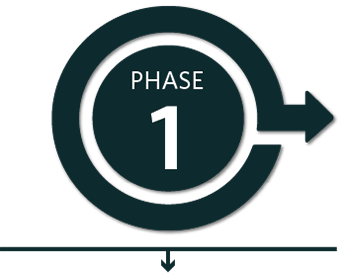
Project
Scoping
- Initial stakeholder meetings
- Plan audit
- Public engagement strategy
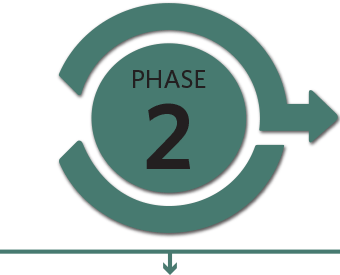
Part 1: TARGETED COMP PLAN UPDATE
- Update plan foundations
- Future land use plan/key policy choices
- Updated Comprehensive Plan draft/adoption
Part 2: CODE UPDATE (INITIAL TASKS)
- Reorganization and consolidation
- Updates to procedures
- Code assessment
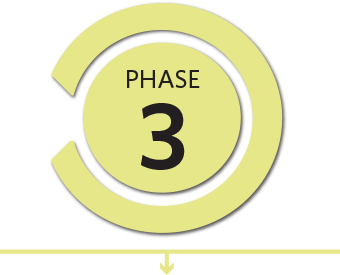
CODE UPDATE (REMAINING TASKS)
- Zone districts, uses, and development standards
- Consolidated draft/adoption
Opportunities for community and stakeholder input were provided throughout the Comprehensive Plan update. Check out “Past Events & Outreach” below. More outreach and input is planned for the initial tasks of phase 3 code updates.
Upcoming Events
Comprehensive Plan
The Ketchum City Council held a public hearing and adopted the 2025 Cohesive Ketchum Comprehensive Plan on September 11, 2025. Click here to watch the meeting. The city is grateful to all who participated in the process and looks forward to continuing discussions on community-wide issues through the development of future changes to the city’s land use regulations.
Code Updates
The Ketchum City Council held a public hearing and approved the consolidated and reorganized code on November 17, 2025 (watch here). The regulations are in effect as of January 1, 2026.
You may continue providing comments by sending an email to [email protected], or by attending the upcoming meeting.
Past Events & Outreach
Advisory Groups
In addition to the various opportunities for community and stakeholder engagement, the project team is supported by three advisory groups—the Citizens Advisory Committee, Code Advisory Group, and Technical Advisory Group.
Citizens Advisory Committee
The Citizens Advisory Committee provides feedback on the vision, goals, and policies for the Comprehensive Plan Update and is comprised of various representatives from different neighborhoods and local businesses within Ketchum and its area of city impact.
Code Advisory Group
The Code Advisory Group provides input on interim documents associated with the Code Update and includes representatives from the Planning and Zoning Commission, City of Ketchum departments, and outside stakeholders that have a technical background and knowledge of the city’s land use regulations.
Technical Advisory Group
The Technical Advisory Group, which was established by the city in 2023, provides strategic input and guidance on community design and development issues related to both the Comprehensive Plan and Code Update processes.
Comprehensive Plan
Code Update
Related Plans and Studies
- 2024 Parking Management Plan
- 2024 Blaine County Community Bicycle and Pedestrian Master Plan
- 2020 Master Transportation Plan
- 2023 Housing Needs Assessment Survey Results
- 2022-2023 Housing Action Plan
- Blaine County 5B Can Climate Action Plan
- Blaine County Recreation District: Sports & Recreation Infrastructure Feasibility Assessment
Comprehensive Plan
Code Update
- The previous Titles 16 and 17 (Subdivision Regulations and Zoning Ordinance) have now been consolidated into our Land Development Code.
